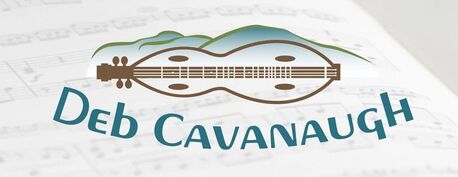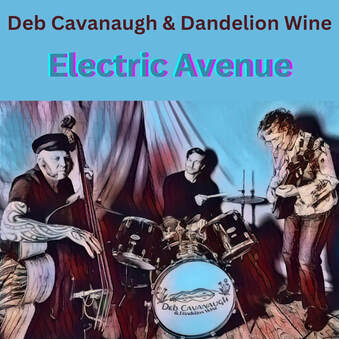For downloadable bio and photos: https://bit.ly/3hJthLz
Album review of "Love Songs & Lullabies" in Nippertown
https://nippertown.com/2021/05/28/album-review-love-songs-lullabies-by-deb-cavanaugh/
https://nippertown.com/2021/05/28/album-review-love-songs-lullabies-by-deb-cavanaugh/
|
Electric Avenue release announcement in "The 12866" blog: https://12866blog.wordpress.com/2022/12/23/shes-gonna-rock-down-to/
|
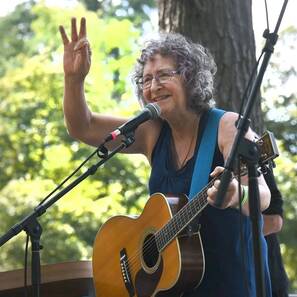
RadioRadioX interview November 7th, 2022
https://radioradiox.com/2022/11/07/interview-with-deb-cavanaugh-by-niki-kaos/
RadioRadioX Perspectives feature October 11th, 2023
https://radioradiox.com/2023/10/11/deb-cavanaugh-perspectives-stephanie-j-bartik/
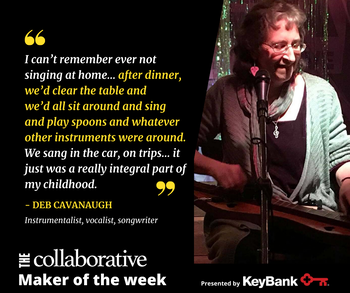
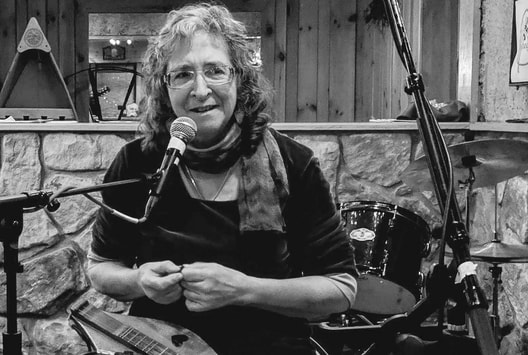 Deb Cavanaugh performs with a wide array of instruments, including a banjo,
mandolin and mountain dulcimer.
Deb Cavanaugh performs with a wide array of instruments, including a banjo,
mandolin and mountain dulcimer.
Xperience Monthly May 2019 Issue
Thumbs Up and Open Road Music
Chasing the next great experience has given artist Deb Cavanaugh a window on the world she can roll down.
By Liam Sweeny
Multi-instrumental. Multi-talented. Many styles of music. I love these phrases, and I wish that they were a stock-standard definition, like a title you get just for playing your first show. But only a few people can truly pin these to their lapels. Deb Cavanaugh, of course, is one of them. With a resume that stretches back to the early eighties Albany scene and the psychedelic band General Eclectic to a folk sound that is at once haunting and homey, Deb Cavanaugh has exemplified the talent profile of the Capital Region. I sit down with Deb to talk of the best of times.
RRX: You spent a lot of the time hitchhiking across country in the past, stopping to play wherever you could. My father was a similar traveler, and he looks back fondly. In your experience, could a young singer in their twenties get anywhere near that kind of experience under their belt today? And how would it have to be different?
DC: I do think it’s more difficult today because times really have changed. I did most of that traveling in 1974 and ‘75 when it was easier to get rides and was also more acceptable, although I still pick people up when I see them. I think it’s possible to have similar experiences if you’re willing to take chances with no expectations. The beauty of hitchhiking is that there’s such a random assortment of people who pick you up. However, I think it’s important to enter into it with the acceptance that you’re going to listen to the stories of the people who give you the rides. That’s where the experiences are. My former husband referred to himself as a “road scholar,” and that is so true. You learn from the people you meet.
RRX: What I really like about your music, as I’m listening now, is how tightly the instrumentation, namely guitar, and your vocals are mutually reinforcing. I’m having a real hard time figuring out if you wrote words for the music or music for the words. Do you have a particular flow in your songwriting, like one you usually start out with?
DC: Every song is different. Sometimes I’m inspired by a phrase, and sometimes the music comes first. It also depends on what instrument I’m playing. After taking a series of songwriting workshops, first with Janis Ian then with Bob Franke, I started giving myself assignments to challenge myself and stay out of a specific mold. Then I also have instrumental pieces that some people want me to write words for, but they feel complete to me as they are.
Thumbs Up and Open Road Music
Chasing the next great experience has given artist Deb Cavanaugh a window on the world she can roll down.
By Liam Sweeny
Multi-instrumental. Multi-talented. Many styles of music. I love these phrases, and I wish that they were a stock-standard definition, like a title you get just for playing your first show. But only a few people can truly pin these to their lapels. Deb Cavanaugh, of course, is one of them. With a resume that stretches back to the early eighties Albany scene and the psychedelic band General Eclectic to a folk sound that is at once haunting and homey, Deb Cavanaugh has exemplified the talent profile of the Capital Region. I sit down with Deb to talk of the best of times.
RRX: You spent a lot of the time hitchhiking across country in the past, stopping to play wherever you could. My father was a similar traveler, and he looks back fondly. In your experience, could a young singer in their twenties get anywhere near that kind of experience under their belt today? And how would it have to be different?
DC: I do think it’s more difficult today because times really have changed. I did most of that traveling in 1974 and ‘75 when it was easier to get rides and was also more acceptable, although I still pick people up when I see them. I think it’s possible to have similar experiences if you’re willing to take chances with no expectations. The beauty of hitchhiking is that there’s such a random assortment of people who pick you up. However, I think it’s important to enter into it with the acceptance that you’re going to listen to the stories of the people who give you the rides. That’s where the experiences are. My former husband referred to himself as a “road scholar,” and that is so true. You learn from the people you meet.
RRX: What I really like about your music, as I’m listening now, is how tightly the instrumentation, namely guitar, and your vocals are mutually reinforcing. I’m having a real hard time figuring out if you wrote words for the music or music for the words. Do you have a particular flow in your songwriting, like one you usually start out with?
DC: Every song is different. Sometimes I’m inspired by a phrase, and sometimes the music comes first. It also depends on what instrument I’m playing. After taking a series of songwriting workshops, first with Janis Ian then with Bob Franke, I started giving myself assignments to challenge myself and stay out of a specific mold. Then I also have instrumental pieces that some people want me to write words for, but they feel complete to me as they are.
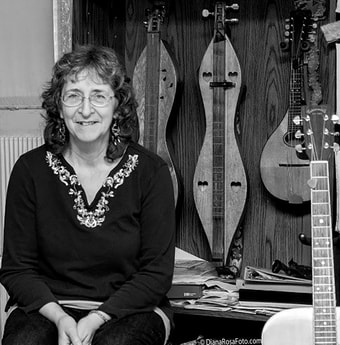 Cavanaugh will be bringing a piece of Americana to Beijing, China.
Cavanaugh will be bringing a piece of Americana to Beijing, China.
RRX: There’s a lot of “story” to your music. I get the sense that there’s something in it that’s greater than the sum of parts. I know that’s really an element of your life, which can’t truly be broken down, but if you had to think about it, are there themes that you like to play off, or that maybe you need to?
DC: That’s an interesting question. If you had asked me a year ago, I would have said that there was no real theme. However, I recently was in a songwriting group, and they commented that I often have elements of nature in my songs including a lot of night sky images. I know that I write a lot from my life experiences, too. It’s how I’ve gotten through a lot of traumatic events over the years. I also seem to write a lot of songs in ¾ time. I guess I’m fond of that swaying feeling you get with waltzes.
RRX: You are a multi-instrumentalist. You play guitar, mandolin, mountain dulcimer and banjo. I know from being a guitar player once that even something like an effect can give you a whole new voice. So, with these four different string instruments, how does “voice” come into play when you write songs with, or for them?
DC: Each instrument definitely demands their own songs. The dulcimer and mandolin have their own unique sound and often sing unique types of songs. I’ve also been enjoying doing rock and roll covers on the mountain dulcimer with a wide range of effects. Those effects are changing the way I think about the dulcimer in general and changing the types of songs written on that instrument. I was classically trained on piano and occasionally write songs for that instrument as well. I haven’t yet written for the banjo, but I’m sure the same thing will happen. I also like to play in alternate tunings on the guitar. As soon as I start playing in one of those tunings, thesongs start writing themselves, and they are very different from the other guitar songs. I’ve been writing songs since I was a teen but didn’t start playing strings until I was 40. It really changed everything.
RRX: A question about Heldeberg Music Together®, which fascinates me. This is something that you own and run, and it teaches music, in one way or another, from birth through four years old, from five to seven, and help for adults. So, since this is actually the coolest thing in the world, can you just tell us all about it?
DC: I love teaching Music Together®. It’s an internationally recognized research-based early childhood music education program that’s been running since 1987. I own a franchise in Delmar and Troy. There are 3000 centers in over 40 countries. The thing I love the best about it is I get to help create musical families. The grownups, who come with their children, are the ones who are required to participate. We give the kids an organic learning experience in which they can just observe, if that’s what works for them. The adults are modeling the activities but also their love for music and willingness to jump right in and make mistakes because it’s so much fun. The music we’re learning is both simple and complex and is really interesting to listen to. I often have professional musicians bringing their kids to these classes because they see the value in it.
RRX: You‘ve had a lot of unique experiences, so many of them we haven’t mentioned (like you being involved in a choir with Duke Ellington.) So, when someone starts out today, and their heart is gold, they feel the music, but they know there’s something out there they need to experience, how do they find it? Or maybe, how do they look?
DC: I think the main thing is to be open to a wide variety of musical styles and varied experiences. My boyfriend often laughs about how spontaneous I am. I think it’s that spontaneity that’s brought me all the really cool experiences I’ve had. I’m also a big believer in positivity and creative visualization. I try to stay open to all possibilities and visualize what I need in my life. It’s funny; recently people have been referring to me as brave, which is not something I had really thought about before. It seemed to me that I foolishly jumped into situations without any forethought. It’s that spontaneity again. It may not work for everyone, but so far, it’s worked well for me. The other important component is making the music your own. I rarely play a cover exactly the way it was written and don’t sing a song the same way twice. I have to feel them in the moment. That’s where the magic comes into play.
RRX: Here is where you can answer the question we didn’t ask. Who do you love out there? What do you have on your calendar for 2019? Which of your instruments is the favorite you’re not supposed to have? Anything; the floor is yours.the floor is yours.
DC: I have so many exciting things coming up this year. First off, I am going to Beijing, China for two weeks in mid-May to teach music in two bilingual preschools. I’ll be teaching songs in English and bringing along traditional American instruments, mountain dulcimer and limberjack, and a crankie which is a traditional American folk art that illustrates the songs. I get to teach the teachers as well and do a program for the parents. And … they would like me to go back once a year. Another fun project is my two weekly blogs. One is a family blog and the other is for my memoirs and opinion pieces. The memoir pieces about my younger days as a hippie vagabond parent are being turned into a book, Recollections of a Hippie Mama. The blog posts kind of serve as trailers for the finished product. I’m planning to put those on hold while in China and do a travelogue series of blog posts while I’m away. Lastly, I’ve finally gotten a band together with Bob Donald on back-up vocals, guitar and keyboard, NikiChaos on backup vocals and drums, and Shows Leary on bass. You can look for “Deb Cavanaugh and Dandelion Wine” doing quirky, fun-loving roots music in the near future. Our first show as a whole band will be at The Beer Diviner in Petersburg, NY on June 1st. This seems to be the year that a lot of things I’ve worked towards are coming together.
https://radioradiox.com/wp-content/uploads/2019/03/Xperience-Monthly-May-2019-Issue.pdf
DC: That’s an interesting question. If you had asked me a year ago, I would have said that there was no real theme. However, I recently was in a songwriting group, and they commented that I often have elements of nature in my songs including a lot of night sky images. I know that I write a lot from my life experiences, too. It’s how I’ve gotten through a lot of traumatic events over the years. I also seem to write a lot of songs in ¾ time. I guess I’m fond of that swaying feeling you get with waltzes.
RRX: You are a multi-instrumentalist. You play guitar, mandolin, mountain dulcimer and banjo. I know from being a guitar player once that even something like an effect can give you a whole new voice. So, with these four different string instruments, how does “voice” come into play when you write songs with, or for them?
DC: Each instrument definitely demands their own songs. The dulcimer and mandolin have their own unique sound and often sing unique types of songs. I’ve also been enjoying doing rock and roll covers on the mountain dulcimer with a wide range of effects. Those effects are changing the way I think about the dulcimer in general and changing the types of songs written on that instrument. I was classically trained on piano and occasionally write songs for that instrument as well. I haven’t yet written for the banjo, but I’m sure the same thing will happen. I also like to play in alternate tunings on the guitar. As soon as I start playing in one of those tunings, thesongs start writing themselves, and they are very different from the other guitar songs. I’ve been writing songs since I was a teen but didn’t start playing strings until I was 40. It really changed everything.
RRX: A question about Heldeberg Music Together®, which fascinates me. This is something that you own and run, and it teaches music, in one way or another, from birth through four years old, from five to seven, and help for adults. So, since this is actually the coolest thing in the world, can you just tell us all about it?
DC: I love teaching Music Together®. It’s an internationally recognized research-based early childhood music education program that’s been running since 1987. I own a franchise in Delmar and Troy. There are 3000 centers in over 40 countries. The thing I love the best about it is I get to help create musical families. The grownups, who come with their children, are the ones who are required to participate. We give the kids an organic learning experience in which they can just observe, if that’s what works for them. The adults are modeling the activities but also their love for music and willingness to jump right in and make mistakes because it’s so much fun. The music we’re learning is both simple and complex and is really interesting to listen to. I often have professional musicians bringing their kids to these classes because they see the value in it.
RRX: You‘ve had a lot of unique experiences, so many of them we haven’t mentioned (like you being involved in a choir with Duke Ellington.) So, when someone starts out today, and their heart is gold, they feel the music, but they know there’s something out there they need to experience, how do they find it? Or maybe, how do they look?
DC: I think the main thing is to be open to a wide variety of musical styles and varied experiences. My boyfriend often laughs about how spontaneous I am. I think it’s that spontaneity that’s brought me all the really cool experiences I’ve had. I’m also a big believer in positivity and creative visualization. I try to stay open to all possibilities and visualize what I need in my life. It’s funny; recently people have been referring to me as brave, which is not something I had really thought about before. It seemed to me that I foolishly jumped into situations without any forethought. It’s that spontaneity again. It may not work for everyone, but so far, it’s worked well for me. The other important component is making the music your own. I rarely play a cover exactly the way it was written and don’t sing a song the same way twice. I have to feel them in the moment. That’s where the magic comes into play.
RRX: Here is where you can answer the question we didn’t ask. Who do you love out there? What do you have on your calendar for 2019? Which of your instruments is the favorite you’re not supposed to have? Anything; the floor is yours.the floor is yours.
DC: I have so many exciting things coming up this year. First off, I am going to Beijing, China for two weeks in mid-May to teach music in two bilingual preschools. I’ll be teaching songs in English and bringing along traditional American instruments, mountain dulcimer and limberjack, and a crankie which is a traditional American folk art that illustrates the songs. I get to teach the teachers as well and do a program for the parents. And … they would like me to go back once a year. Another fun project is my two weekly blogs. One is a family blog and the other is for my memoirs and opinion pieces. The memoir pieces about my younger days as a hippie vagabond parent are being turned into a book, Recollections of a Hippie Mama. The blog posts kind of serve as trailers for the finished product. I’m planning to put those on hold while in China and do a travelogue series of blog posts while I’m away. Lastly, I’ve finally gotten a band together with Bob Donald on back-up vocals, guitar and keyboard, NikiChaos on backup vocals and drums, and Shows Leary on bass. You can look for “Deb Cavanaugh and Dandelion Wine” doing quirky, fun-loving roots music in the near future. Our first show as a whole band will be at The Beer Diviner in Petersburg, NY on June 1st. This seems to be the year that a lot of things I’ve worked towards are coming together.
https://radioradiox.com/wp-content/uploads/2019/03/Xperience-Monthly-May-2019-Issue.pdf
Here is a video clip of a show at Emack & Bolio's and a review of "Highway in Your Eyes:
http://www.nippertown.com/2014/07/07/live-deb-cavanaugh-emack-bolios-61314/
Back in the ’80s – I know for many of you this is equivalent to a fairy tale – a band called General Eclectic (a sly play on General Electric, the industrial behemoth) roamed through Albany and its environs spreading its resoundingly anti-authoritarian gospel of hot blues and spicy, tasteful rock ‘n roll. At its incandescent center were Deb and Paul Cavanaugh, a husband and wife team of rebels and true believers. Against the complacency and blasé conformism of the era (a “peaceful time” chock full of vicious injustices), they flung every ounce and gram of their energy, every microdot.
Okay, back to the future. Deb Cavanaugh remembers her late husband with a song called “Highway in Your Eyes,” which traces their blossoming romance and cross-country adventures with wistful, knowing backward glances. As she sings it, you can feel her toying with the giddiness of young love, the fleeting, star-bursty emotional zingers, the onset of adult responsibilities, the whole catalog of life’s delights and disappointments. Its message seems to be: despite all that you know better, we have no choice but to surrender to our most burning desires. Our truest selves will not take ‘no’ for an answer. - Joel Patterson, videographer, recording and sound engineer, Petersburgh, NY
http://www.nippertown.com/2014/07/07/live-deb-cavanaugh-emack-bolios-61314/
Back in the ’80s – I know for many of you this is equivalent to a fairy tale – a band called General Eclectic (a sly play on General Electric, the industrial behemoth) roamed through Albany and its environs spreading its resoundingly anti-authoritarian gospel of hot blues and spicy, tasteful rock ‘n roll. At its incandescent center were Deb and Paul Cavanaugh, a husband and wife team of rebels and true believers. Against the complacency and blasé conformism of the era (a “peaceful time” chock full of vicious injustices), they flung every ounce and gram of their energy, every microdot.
Okay, back to the future. Deb Cavanaugh remembers her late husband with a song called “Highway in Your Eyes,” which traces their blossoming romance and cross-country adventures with wistful, knowing backward glances. As she sings it, you can feel her toying with the giddiness of young love, the fleeting, star-bursty emotional zingers, the onset of adult responsibilities, the whole catalog of life’s delights and disappointments. Its message seems to be: despite all that you know better, we have no choice but to surrender to our most burning desires. Our truest selves will not take ‘no’ for an answer. - Joel Patterson, videographer, recording and sound engineer, Petersburgh, NY
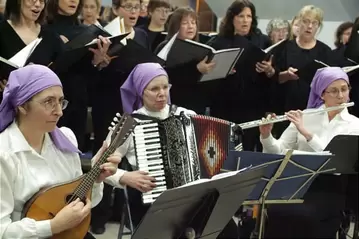
Here's a link to an article in the New York Times about the Ars Choralis project that was performed in Germany in 2009, “Music in Desperate Times: Remembering the Women’s Orchestra of Birkenau.” http://www.nytimes.com/2009/03/26/arts/music/26birk.html?pagewanted=all&_r=1&
and another review of the same program:
Music In Desperate Times Review
In the darkest times, music provides solace and illustrates what is best in the human spirit.
During the depths of World War II, women musicians incarcerated at the Auschwitz/Birkenau concentration camp were required to play for their Nazi captors. This is a story about how music saved the lives of those women. It is also the story of a small-town chorus that has brought back the music, hope, grief and resilience of these women.
Over one million people were murdered in Birkenau gas chambers. In exchange for their survival, a women’s orchestra was formed by the S.S. at Birchenau. During the year and a half it existed, 54 women participated in the orchestra. All but the conductor survived.
Barbara Pickhardt, conductor of the Woodstock, NY chorus, Ars Choralis, researched survivor¹s memoirs and created Music in Desperate Times: Remembering the Women¹s Orchestra of Birkenau. The concert interwove orchestral music (Schumann, Chopin, Puccini, Mendelssohn and others) with spoken memoirs and songs of hope, peace and resistance sung by the chorus. Donning the simple lavender scarves worn by the Birkenau musicians, the members of the reconstructed orchestra felt a shiver of connection to the original orchestra as they played arrangements of the same music played in the camps.
Ars Choralis performed Music in Desperate Times: Remembering the Women’s Orchestra of Birkenau to great acclaim in Hudson Valley churches, colleges and synagogues. The audience response was so powerful that repeat performances were demanded. On Saturday, March 28th, Ars Choralis performed the concert for an appreciative audience of 1100 people at the newly re-dedicated and renovated Cathedral Church of Saint John The Divine in New York City. The concert was introduced by Dr Ruth Westheimer, herself a survivor of the holocaust. St. John The Divine is a landmark church, the largest Anglican Cathedral in North America.
• Survivors of the Ravensbrück concentration camp in Furstenberg, Germany have invited Ars Choralis to perform at their annual Liberation Day ceremonies on April 18 and 19, 2009 on the grounds of the camp.
• Heilig Kreuz Passion Church in Berlin has invited Ars Choralis to perform Music in Desperate Times on Friday, April 17, 2009.
https://www.deseret.com/2009/3/29/20309360/u-s-group-re-creates-nazi-death-camp-orchestra
Here is an interview I did about the Family Jam in March 2013.
http://wnyt.com/article/stories/s2960642.shtml
http://wnyt.com/article/stories/s2960642.shtml
About Cavanaugh & Kavanaugh:
“This … duo, who just happen to share the same last name in pronunciation if not spelling, have been a long time part of the Capital District music scene… talented multi-instrumentalists (banjo, guitar, piano, mandolin, dulcimer, limberjack) who share a commitment to music as a way of life.”
- Caffè Lena (Saratoga Springs, NY)
“… by singing old songs alongside their originals, they seem to relish being part of a kind of folksong dialogue that stretches back through history, but still touches the present… Even among an evolving roots-music community where younger generations of artists are bending what folk means, Cavanaugh and Kavanaugh still have the earnest, sweet sound that’s typical of their baby boomer generation and the time that generation ushered in the first folk boom.”
- Philip Schwartz Gazette Reporter (Schenectady, NY)
“On a snowy March afternoon, the duo of Deb Cavanaugh and Dick Kavanaugh brought spring to the Cambridge Library. Their musical program was enjoyed by both young and old. The little ones were singing along, and delighted to see the limberjack dancing. After the performance, everyone was eager to inspect the various instruments. I highly recommend the duo.”
- anonymous (Cambridge Librarian, Cambridge, NY)
“Not only are Deb Cavanaugh and Dick Kavanaugh both multi-talented instrumentalists, but they both sing and contribute some heartfelt original songs…”
-Greg Haymes Times Union CD review (Albany, NY)
“This … duo, who just happen to share the same last name in pronunciation if not spelling, have been a long time part of the Capital District music scene… talented multi-instrumentalists (banjo, guitar, piano, mandolin, dulcimer, limberjack) who share a commitment to music as a way of life.”
- Caffè Lena (Saratoga Springs, NY)
“… by singing old songs alongside their originals, they seem to relish being part of a kind of folksong dialogue that stretches back through history, but still touches the present… Even among an evolving roots-music community where younger generations of artists are bending what folk means, Cavanaugh and Kavanaugh still have the earnest, sweet sound that’s typical of their baby boomer generation and the time that generation ushered in the first folk boom.”
- Philip Schwartz Gazette Reporter (Schenectady, NY)
“On a snowy March afternoon, the duo of Deb Cavanaugh and Dick Kavanaugh brought spring to the Cambridge Library. Their musical program was enjoyed by both young and old. The little ones were singing along, and delighted to see the limberjack dancing. After the performance, everyone was eager to inspect the various instruments. I highly recommend the duo.”
- anonymous (Cambridge Librarian, Cambridge, NY)
“Not only are Deb Cavanaugh and Dick Kavanaugh both multi-talented instrumentalists, but they both sing and contribute some heartfelt original songs…”
-Greg Haymes Times Union CD review (Albany, NY)
From The Daily Gazette, 11-7-07, Page D8
LIVE IN THE CLUBS
Folk duo Cavanaugh and Kavanaugh blend genre’s past with its present
Partners in life and music doing their part to keep traditions alive
BY PHILIP SCHWARTZ Gazette Reporter
Deb Cavanaugh and Dick Kavanaugh get passionate when the subject of traditional music arises. And in a conversation with the folk duo — billed as Cavanaugh and Kavanaugh — that subject will inevitably come up. Over coffee and tea at a cafe near their Albany home, the couple, both life and musical partners, get into the importance of folk music, the need to keep traditions alive and how it’s all tied to our understanding of American culture and history. “It’s important for us to know and remember our culture,” Cavanaugh says, “and it’s getting lost and increasingly becoming a corporate culture.”
Managing to avoid a self-righteous tone, both Cavanaugh and Kavanaugh talk about their mission (though they don’t expressly use that word) to help pass along the traditions of folk through their workshops and performances. And by singing old songs alongside their originals, they seem to relish being part of a kind of folksong dialogue that stretches back through history, but still touches the present.
ORGANIC GROWTH
When they first started playing as a duo, however, there wasn’t any sort of overarching commitment to traditions or preservation, Cavanaugh said. “It’s become more of a focus over the years,” she noted. “I started with just saying ‘I’d like to do some traditional stuff.’ Then as time went on, it became more deliberate.”
Cavanaugh and Kavanaugh have been life partners for 14 years, their coupling somewhat fortuitous considering the similar last names. Cavanaugh, a full-time musician who teaches and gives workshops, has been playing all her life. “I grew up in a family where there was always singing,” the Stamford, Conn., native said. “We were always playing music. We would often, after dinner, clear the table, sit and sing. . . . I was singing harmonies when I was 3. The first time I got a paying gig, I was 15.”
By contrast, Kavanaugh, an electrician by trade, grew up in Delmar with a purist’s love of folk and acoustic blues, but didn’t start playing until his mid-30s. Similarly, his partner, though she spent her younger days concentrating on the piano and vocals, waited until age 40 to take up the stringed instruments that are so much a part of the Cavanaugh and Kavanaugh sound: mandolin, dulcimer, guitar. The stringed instruments he plays are guitar, mandolin, fiddle and banjo. Live performances can include any combination of those, in addition to Cavanaugh’s limber jack or Kavanaugh’s pennywhistle.
TIMELESS SONGS
The traditional songs they play, meanwhile, center on the old-time Irish and Southern U.S. traditions. Anti-war and labor songs such as “Green Fields of France,” “Mrs. McGrath,” “Masters of War,” “Granite Mills” and “I Feel Like I’m Fixin’ to Die Rag” are all part of the repertoire. But underneath it all is a slight, if mild, tension between Cavanaugh’s want to infuse new influences and Kavanaugh’s more purist nature. This can be a strength, however, Cavanaugh said. “That’s what makes us interesting,” she said. “Dick has that traditional focus and I want to be wild and do whatever.”
Playing traditional music, however, can be somewhat of an occupational hazard in a culture obsessed with youth and the taste of now. Even among an evolving roots-music community where younger generations of artists are bending what folk means, Cavanaugh and Kavanaugh still have the earnest, sweet sound that’s typical of their baby boomer generation and the time that generation ushered in the first folk boom. Nevertheless, Kavanaugh maintains that this music is just as relevant today, and will continue to be for the next generation.
“There’s a string of commonality to folk music where it touches everyone,” he said. “I feel like most of these traditional songs are timeless. Sing a song like ‘Green Fields of France’ and that was written about World War I. It still moves people. Not much has changed, you know. We’re still fighting wars.”
LIVE IN THE CLUBS
Folk duo Cavanaugh and Kavanaugh blend genre’s past with its present
Partners in life and music doing their part to keep traditions alive
BY PHILIP SCHWARTZ Gazette Reporter
Deb Cavanaugh and Dick Kavanaugh get passionate when the subject of traditional music arises. And in a conversation with the folk duo — billed as Cavanaugh and Kavanaugh — that subject will inevitably come up. Over coffee and tea at a cafe near their Albany home, the couple, both life and musical partners, get into the importance of folk music, the need to keep traditions alive and how it’s all tied to our understanding of American culture and history. “It’s important for us to know and remember our culture,” Cavanaugh says, “and it’s getting lost and increasingly becoming a corporate culture.”
Managing to avoid a self-righteous tone, both Cavanaugh and Kavanaugh talk about their mission (though they don’t expressly use that word) to help pass along the traditions of folk through their workshops and performances. And by singing old songs alongside their originals, they seem to relish being part of a kind of folksong dialogue that stretches back through history, but still touches the present.
ORGANIC GROWTH
When they first started playing as a duo, however, there wasn’t any sort of overarching commitment to traditions or preservation, Cavanaugh said. “It’s become more of a focus over the years,” she noted. “I started with just saying ‘I’d like to do some traditional stuff.’ Then as time went on, it became more deliberate.”
Cavanaugh and Kavanaugh have been life partners for 14 years, their coupling somewhat fortuitous considering the similar last names. Cavanaugh, a full-time musician who teaches and gives workshops, has been playing all her life. “I grew up in a family where there was always singing,” the Stamford, Conn., native said. “We were always playing music. We would often, after dinner, clear the table, sit and sing. . . . I was singing harmonies when I was 3. The first time I got a paying gig, I was 15.”
By contrast, Kavanaugh, an electrician by trade, grew up in Delmar with a purist’s love of folk and acoustic blues, but didn’t start playing until his mid-30s. Similarly, his partner, though she spent her younger days concentrating on the piano and vocals, waited until age 40 to take up the stringed instruments that are so much a part of the Cavanaugh and Kavanaugh sound: mandolin, dulcimer, guitar. The stringed instruments he plays are guitar, mandolin, fiddle and banjo. Live performances can include any combination of those, in addition to Cavanaugh’s limber jack or Kavanaugh’s pennywhistle.
TIMELESS SONGS
The traditional songs they play, meanwhile, center on the old-time Irish and Southern U.S. traditions. Anti-war and labor songs such as “Green Fields of France,” “Mrs. McGrath,” “Masters of War,” “Granite Mills” and “I Feel Like I’m Fixin’ to Die Rag” are all part of the repertoire. But underneath it all is a slight, if mild, tension between Cavanaugh’s want to infuse new influences and Kavanaugh’s more purist nature. This can be a strength, however, Cavanaugh said. “That’s what makes us interesting,” she said. “Dick has that traditional focus and I want to be wild and do whatever.”
Playing traditional music, however, can be somewhat of an occupational hazard in a culture obsessed with youth and the taste of now. Even among an evolving roots-music community where younger generations of artists are bending what folk means, Cavanaugh and Kavanaugh still have the earnest, sweet sound that’s typical of their baby boomer generation and the time that generation ushered in the first folk boom. Nevertheless, Kavanaugh maintains that this music is just as relevant today, and will continue to be for the next generation.
“There’s a string of commonality to folk music where it touches everyone,” he said. “I feel like most of these traditional songs are timeless. Sing a song like ‘Green Fields of France’ and that was written about World War I. It still moves people. Not much has changed, you know. We’re still fighting wars.”
